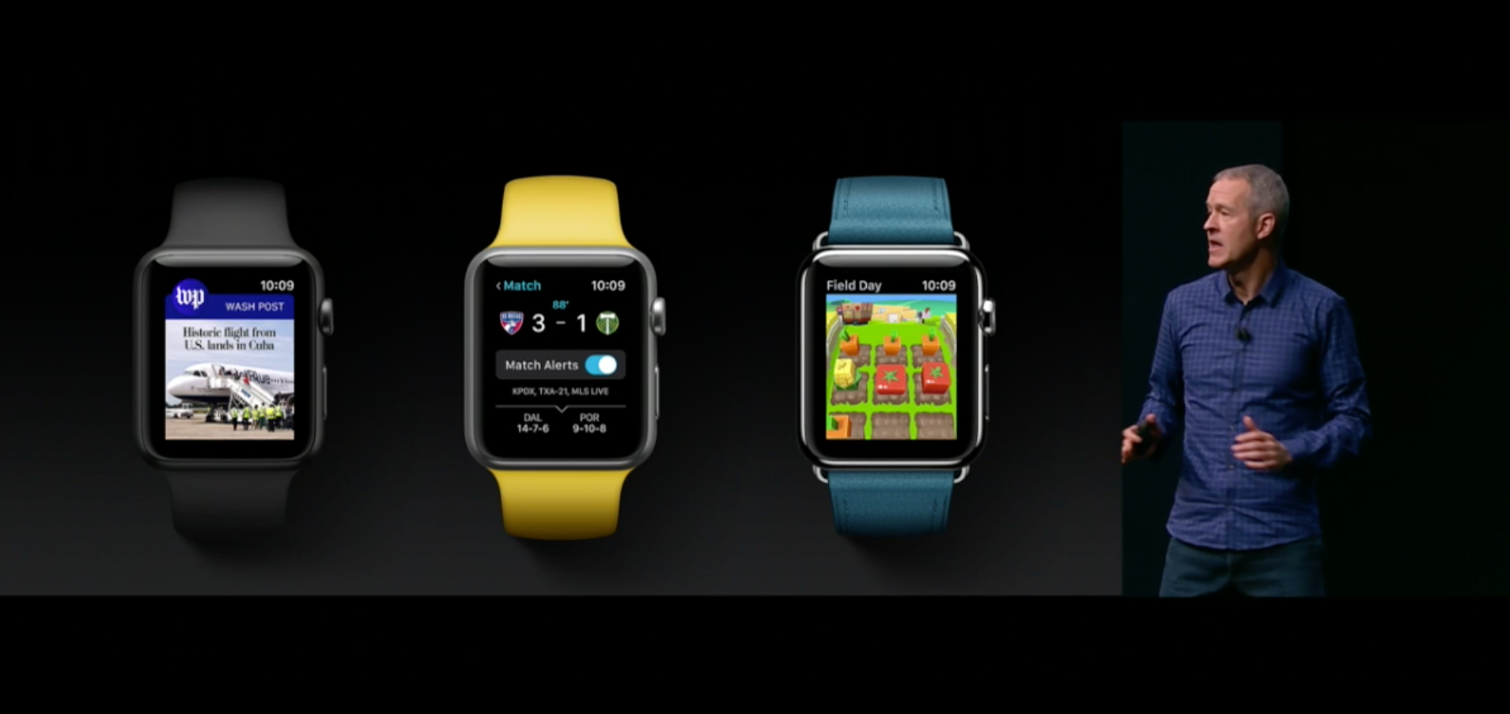Apple Watch Finds a Purpose: Fitness
Apple amps up the Apple Watch's fitness features, which could mean big business for a weakening smart-watch market.
Apple unveiled its new Apple Watch Series 2 at its widely anticipated press event today (Sept. 7) with a host of updates.

At $369, the new Apple Watch will have a brighter screen than its predecessor, making it easier to see outdoors. It will also run 50 percent faster than last year's model, thanks to a dual-core processor. Users will be able to send a quick text with a double tap, and the new watch can also display cute full-screen effects, such as falling confetti, and offers a safer, "heads-up" way to play Pokemon Go. But most importantly, Apple paid special attention to a specific subset of potential Watch users: people focused on fitness.
MORE: Best Smartwatches - Top Picks for Android and iOS
The Apple Watch Series 2 will have a built-in GPS chip, which frees runners from holding onto their iPhones during runs, while allowing accurate reads of pace, distance and elevation. Like many other fitness-focused devices, the new Apple Watch will monitor heart rate in real-time, but is also waterproof up to 50 meters deep.
The Apple Watch Series 2 holds up to daily swimming, in the pool and in open water, Apple Chief Operating Officer Jeff Williams said during the company's big event. Apple has also partnered with Nike on the Apple Watch Nike+, made with a lighter aluminum case, also priced at $369.
Overall, Apple's focus on fitness may help consumers find a reason to get an Apple Watch, said Angelo Zino, technology analyst at S&P Global Market Intelligence. When the Apple Watch first came out, Zino said, it didn't really have its own identity. Now, with this focus on fitness, overall perception of the Watch will improve, he said.
GPS was by far the best capability added to the device, Zino said, but perhaps the biggest disappointment with the Apple Watch Series 2 is that it still can't fully operate without being tethered wirelessly to an iPhone.
Sign up to get the BEST of Tom's Guide direct to your inbox.
Get instant access to breaking news, the hottest reviews, great deals and helpful tips.
"We heard absolutely nothing on battery life," Zino told Tom's Guide, adding that we have to assume there are no enhancements on that front. Poor battery life was one of the biggest disappointment when the first Apple Watch came out.
Apple is really trying to appeal to the "citizen athlete" with this new version of the Apple Watch, said Ramon Llamas, an IDC research analyst who covers the wearable tech and smartwatch markets.
But the device's high price tag could still deter some consumers.
Despite the new and improved Apple Watch Series 2 fitness features, those with slimmer wallets and fewer needs may still opt for a more simple fitness tracker, especially now that cheaper activity monitors can deliver text, call and calendar notifications.
"Basic wearables, which include most fitness trackers, have benefited from a combination of factors: a clear value proposition for end users, an abundant selection of devices from multiple vendors, and affordable price points," Llamas said in a research note yesterday (Sept. 6).
"I think you need to see a lower price point coming from Apple ... to get the unit shipments going in the right direction," Zino told Tom's Guide.
He added that an Apple Watch costing less than $200 would really amp up sales.
This year, one in four American adults will use a wearable device, according to the latest estimates from eMarketer. That's about 64 million people. The IDC research note estimates that among all wearable-device makers, Fitbit is the current leader, with more than 25 percent of the market share. Apple owns just 7 percent of the overall wearable device market.
It's important to note though, Llamas told Tom's Guide, that Apple and Fitbit are targeting different types of consumers, with Apple having its eye on not just athletes, but people who want a computer on their wrist, Llamas says.
Llamas says he's especially interested in seeing how sales break out between the Apple Watch Series 2 and the older model, now rebranded and marked down as the Apple Watch Series 1. For $269, the older model will lack many of the features in the new Series 2, but will still come with the Series 2's faster processor.
The Series 2 and the revamped Series 1 debut amid a weakening market for smart watches, which are set apart from other wearables because they can run third-party apps.
Sales of the first Apple Watch, in particular, fell by more than 56 percent last quarter versus the same quarter a year ago, according to the IDC note. But that still meant that Apple sold an estimated 1.6 million Apple Watches worldwide in the quarter, compared to about 600,000 smartwatches sold by runner-up Samsung.
Althea Chang is Associate Director of Content Development for Consumer Reports and was previously a Senior Writer for Tom's Guide, covering mobile devices, health and fitness gadgets and car tech.
-
LARG3HAM I LOVE my Series 1 Apple Watch, and am excited about the new features of Series 2. Any word on how long the battery will last when GPS is activated?Reply
